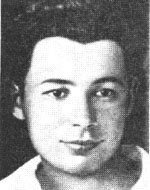Finkelstein, Yosef
Son of Pesia and Jacob. He was born on the 21st of Elul (25.9.1910) in the town of Balti, in Sarabia. At first he studied at the “Heder” and later at the Hebrew Gymnasium in the city. Already in his youth he excelled in the analytical mind, thirst for knowledge, and diligence in studying. At the same time, he was interested in questions of society and the nation, especially in the years of Marx and Borochov, and at a young age he joined Hashomer Hatzair. At the age of 19 he was already a member of the main leadership of this movement and also went to work at the Hechalutz Center. In 1931 he immigrated to Eretz Israel and joined a kibbutz that was organized in Romania and settled in Magdiel. He soon became involved with the kibbutz and became accustomed to manual labor. After a short time he was elected Secretary of the Workers’ Council in Magdiel and served in this position until his departure in 1935 on behalf of Hashomer Hatzair and Hehalutz to Romania. On this mission he spent two years and after returning to Israel he returned to the life of the kibbutz, which in the meantime moved to Sha’ar Ha’amakim and to the workers’ community. On 22 Av, August 19, 1938, Yosef was killed when he was trying to rescue, together with a number of guards, to protect the passengers of a bus that traveled from Haifa to Kiryat Amal and was attacked by Arab gang members near Kibbutz Sha’ar Ha’amakim. He was brought to rest in the cemetery at Kibbutz Sha’ar Ha’amakim. He left a wife and a daughter. His kibbutz published a pamphlet in his memory containing the words of friends about his character. “We saw Finkelstein as a man of deep perception, and we saw him as a person whose goals in his public activity were determined by both realism and daring, not a man of routine and a man of delusion, a man of lively thought who combined the prominence and constant striving for ideological and ideological renewal with devotion to principles and foundations.” On the hill where Joseph fell, Kibbutz Sha’ar Ha’Emakim set up a memorial pillar.
